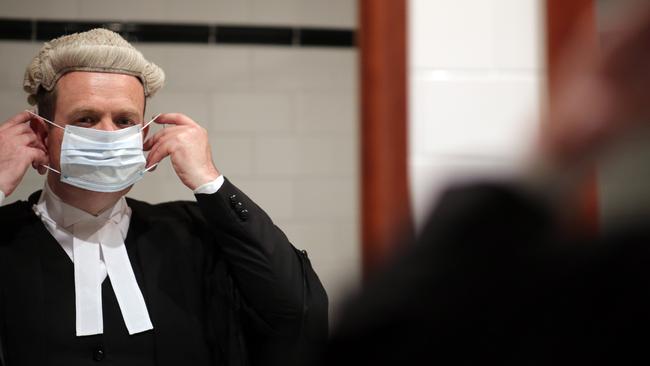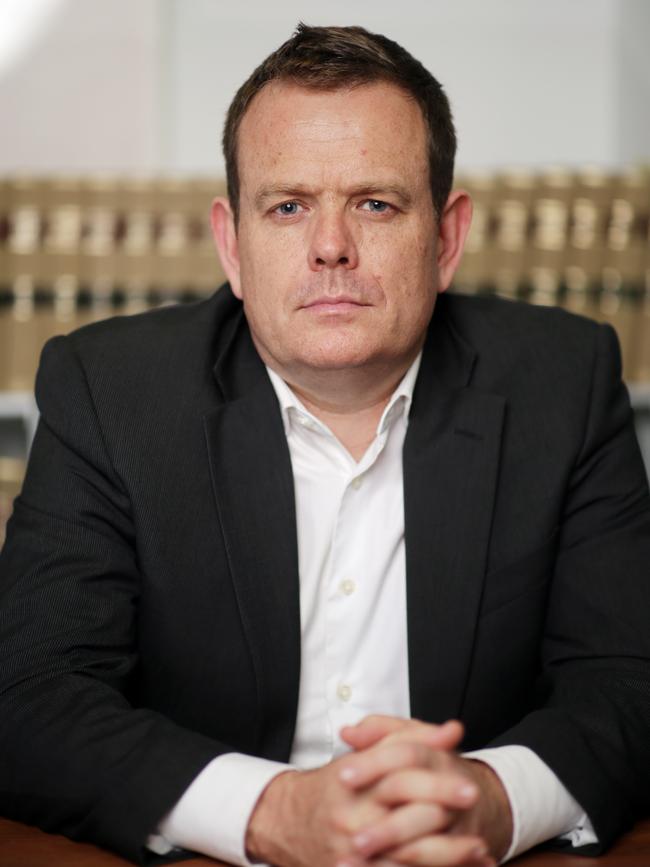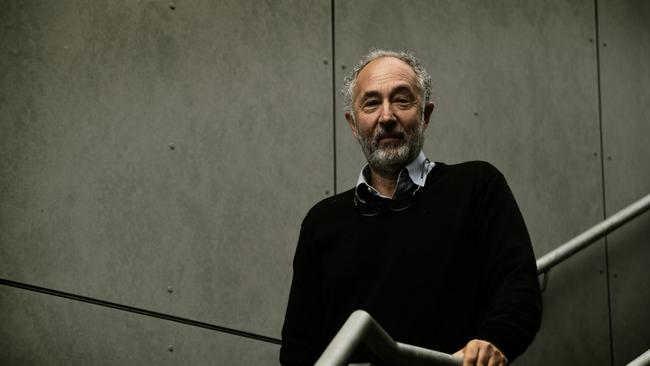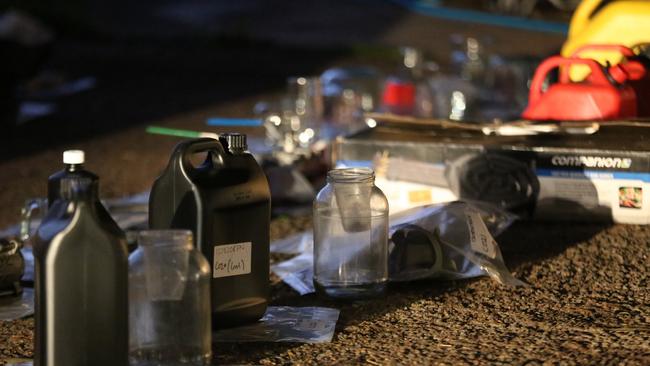Coronavirus triggers drastic changes in NSW criminal justice system
The NSW criminal justice system has undergone drastic changes amid the coronavirus pandemic with some saying it could make justice more “progressive”. SEE THE CHANGES
NSW
Don't miss out on the headlines from NSW. Followed categories will be added to My News.
- Second hotel quarantine security guard tests positive
- Using data to revolutionise public transport in COVID era
The pandemic has forced drastic changes on NSW’s criminal justice system with cops, courts and prisons having to operate in a world where closely packed juries and holding cells have become vectors for the viral threat.
But, with the virus now behind bars and in the courts, some say the pandemic’s disruptions could make justice more “progressive” in NSW.
And swelling prison populations and the war on drugs could be the first major scalps.

Earlier this month the NSW courts confirmed their first case of coronavirus.
It’s understood a judge from Lake Macquarie dined at the Apollo restaurant in Potts Point before returning to their post at their lakeside courthouse.
A few days later the judge fell ill and the court was closed for cleaning, forcing matters to be relisted in nearby Newcastle.
Chief Magistrate of the NSW Local Court, Graeme Henson, was also sent into isolation after dining at the Apollo but tested negative.
MORE NEWS:
Hotel fined for Laundy son birthday lunch breach
Teens praised for disarming ‘gun-wielding’ man at pizza shop
Winter delivers a last blast, dumping snow across NSW
Neither the judge nor the Chief Magistrate is accused of any wrongdoing.
At about the time the judiciary dined at the Greek restaurant, a man flew in to Sydney from Melbourne with the bug incubating in his blood.
Police at the airport quickly realised he was wanted for driving offences and the state’s prison system unwittingly took in its first case. Parklea went into lockdown.
Both cases were contained because the criminal justice system, at all levels, changed how it handles the people within it.
Jury trials were suspended at the start of the first wave and conditions relaxed to allow lawyers, defendants, witnesses and journalists to dial in to court.
Prisons instituted quarantines for all ‘freshies’, limited visits, brought in video calls and began thinking very hard about whether their ballooning remand population really needed to stay behind bars.
Dubbo deputy mayor and prominent NSW barrister Stephen Lawrence made headlines after securing the rights of the first Black Lives Matter rally and used his position to question the expanding police powers in the lockdown.
He said NSW had ushered in “the most draconian regime” of social control on its free citizens while simultaneously liberalising the justice system in ways many thought impossible.
“That’s what’s so interesting with this experiment we’re living through, it tests a lot of the assumptions about the criminal justice system and its interaction with society,” he told The Daily Telegraph.
“It calls into question if we’re jailing the right people, whether we’re allocating criminal punishments for right offences, whether we’re achieving the protection of the community.”

Mr Lawrence, a former prosecutor, said there has been a massive increase in “COVID-bail”, where courts release all but the most high risk accused criminals.
The goal is to prevent an outbreak in the state’s prison system that has been battling to stop overcrowding for years.
Almost 1500 prisoners walked free in eight weeks between March and May, according to the Bureau of Crime Statistics and Research, but no crime wave followed.
The alleged offenders were discharged into a locked down and substantially less criminal society – robbery, assault, sexual offences, break and enters, car theft all dropped between 29 and 42 per cent each in April.
Even reports of domestic violence remained stable despite fears it was going to spike, BOCSAR found.
Mr Lawrence said “the long standing perspective of mass incarceration” was dissolving and the criminal justice system had to face facts – prison terms for non violent, minor offences are no longer viable.
“Those sentences do not increase community safety they decrease it – these people go in and end up damaged, criminalised and traumatised,” he said.
The barrister said the reforms forced on the criminal justice system, without the pandemic, would have caused unbearable political pain and pushback.
But the ball is now rolling and he is calling for a drug decriminalisation trial to be held in a regional town for certain, manageable substances.
“We are jailing sick people for victimless crimes in a way that diverts resources from tackling the so-called Mr Bigs of the drug trade,” he said.
“It’s expensive to lock someone up. We could use that money to address the underlying causes of drug addiction, crime and social dysfunction.”
He’s not alone in the courts calling for the changes to continue.
David Heilpern became one of NSW’s youngest magistrates when he was appointed in 1998.
He was splashed across newspapers in May this year when he stepped down saying he could no longer enforce drug driving laws in country NSW.

“Drug driving laws detect such minute quantities of cannabis that bear no resemblance, whatsoever, to impairment at all,” he told The Daily Telegraph.
“Of the thousands of people I dealt with for drug driving, none were impaired yet they all had to lose their license.
“For people in the country that’s a disaster for their job, their house, their marriage, it can be catastrophic.”
He watched the pandemic change his profession from the sidelines as he withdrew from the courtroom.
The respected legal mind said COVID-19 would teach “many lessons” and one would be about NSW’s bail laws.
Changes to the laws in recent years, BOCSAR found, pushed up the number of accused people being held on remand before their case was finalised.
“Law and order types would say ‘terrific they’re off the streets’ but the COVID bail system calls that into question and we need to ask whether people who are bail refused are a risk,” Mr Heilpern said.
The former magistrate agreed with Mr Lawrence that drug offences were largely “victimless” and were a perfect place for the next chapter of reform.
“The judiciary and commission of inquiry (into the drug ice) and the international experience are all pointing in the same direction,” he said.
Both practitioners were at pains to explain they weren’t soft on crime and didn’t advocate for the “wholesale legalisation” of all substances.
After all, it’s impossible to deny organised crime means drug crime in Australia.
Each and every week the NSW Police bust open hydro houses, meth labs and drug syndicates that import deadly substances into Australia and root their power in violence.

As recently as Friday a police strike force raided homes across the Hunter Region allegedly linked to methamphetamine networks who were in the possession of weapons including a stun gun.
An hour earlier they announced they’d knocked over a Sydney meth lab in an unrelated raid where they found a man cooking meth near an 11-month-old child. Officers say they later found a car, connected to the lab, riddled with bullet holes.
But prostitution, SP bookmaking, abortion were all rife with criminal elements when Mr Heilpern started law, he said, and it was decriminalisation and regulation that got them under control.
“I prefer the American marketplace which is making billions for state governments and putting it into drug and alcohol education,” he said.
“We have done it with alcohol for years and tobacco for years. And it’s a model easy to replicate.”
Originally published as Coronavirus triggers drastic changes in NSW criminal justice system
